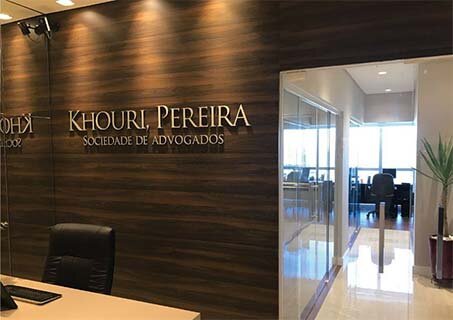Best Faith-Based Law Lawyers in São José dos Campos
Share your needs with us, get contacted by law firms.
Free. Takes 2 min.
List of the best lawyers in São José dos Campos, Brazil
About Faith-Based Law in São José dos Campos, Brazil
Faith-Based Law refers to the intersection of civil law and religious principles, especially as they pertain to religious organizations, their members, and the practice of faith within Brazil. In São José dos Campos, a city with diverse religious communities, Faith-Based Law involves topics such as the legal formation of religious institutions, property issues, religious freedoms, employment matters connected with religious entities, and the relationship between religious doctrine and state law. Brazilian law recognizes religious freedom as a fundamental right, and both federal and municipal regulations ensure the autonomy of faith-based organizations while setting guidelines for their operation within society.
Why You May Need a Lawyer
Legal advice in Faith-Based Law is crucial in various situations. You might need a lawyer if you are involved in:
- The establishment or dissolution of a religious institution
- Property acquisition, donations, or disputes associated with religious use
- Employment conflicts involving faith-based organizations and their staff
- Issues regarding religious discrimination or freedom of worship
- Compliance with government regulations for religious events and gatherings
- Updating or interpreting the statutes and bylaws of religious entities
- Tax exemption processes for religious organizations
- Handling conflicts between secular and religious principles within the law
Legal guidance ensures your rights are protected and your organization complies with both faith principles and Brazilian law.
Local Laws Overview
In São José dos Campos, Faith-Based Law is shaped by the Brazilian Federal Constitution, municipal codes, and specific federal statutes such as Law n. 10.825/2003 regarding religious entities. Key legal aspects include:
- Freedom of religion is protected by Article 5 of the Federal Constitution, guaranteeing the autonomy and independence of religious institutions
- Religious organizations are not required to obtain governmental recognition but must be registered as legal entities to own property or enter contracts
- Tax exemptions for faith-based entities apply to properties and activities directly related to religious purposes
- Municipal regulations may establish norms for sound levels, use of public spaces, and building codes impacting churches, temples, and related facilities
- Labor laws apply to employees of organizations, but certain exceptions and provisions take religious doctrine into account
- Public schools and spaces must respect religious diversity and cannot discriminate on the basis of faith
Staying informed of these rules is critical to avoid legal complications and uphold the integrity of religious practice.
Frequently Asked Questions
What is the legal status of religious organizations in São José dos Campos?
Religious organizations are recognized as legal entities under Brazilian law when they register their statutes at the Civil Registry of Legal Entities. This status enables them to acquire assets, sign contracts, and benefit from certain legal protections and exemptions.
How does the law protect freedom of religion?
Freedom of religion is a constitutional right in Brazil. Individuals and groups are free to practice, express, and organize around their religion without interference, subject to maintaining public order and respecting the rights of others.
Do religious organizations pay taxes?
Religious organizations in São José dos Campos qualify for exemptions from certain federal, state, and municipal taxes on property and activities directly related to their religious mission, provided they comply with legal requirements and registration.
Can a faith-based organization hire employees?
Yes, faith-based organizations can hire employees. Labor laws generally apply, but some aspects may differ due to roles related to religious practices and specific roles of ministers or clergy.
How do religious entities acquire property?
Registered religious entities can purchase, own, and manage property for their activities. Real estate transactions must comply with general property laws and local zoning regulations.
What are common legal issues faced by religious organizations?
Organizations often address issues such as property rights, internal governance, employment disputes, interpretation of statutes, regulatory compliance, and maintaining their tax-exempt status.
Is it possible for religious doctrine to conflict with Brazilian law?
While Brazil respects religious autonomy, religious practices must not violate public order, health, or the rights of others. In case of conflict, Brazilian law prevails in civil matters.
How can a religious entity change its statutes?
Changes to statutes must be approved by the organization’s competent body, recorded in meeting minutes, and registered with the Civil Registry of Legal Entities.
What should I do if I face religious discrimination?
You may file a complaint with local human rights offices, the Public Prosecutor’s Office (Ministério Público), or seek assistance from a lawyer to ensure your rights are protected under Brazilian anti-discrimination laws.
Are there special requirements for religious events in public spaces?
Yes, organizing religious events in public spaces may require permits from the municipal government, especially regarding noise, crowd control, and use of public areas. Compliance with local regulations is necessary.
Additional Resources
For additional information or support in Faith-Based Law in São José dos Campos, you may consult:
- São José dos Campos City Hall (Prefeitura Municipal) - Departments dealing with public spaces, permits, and social policies
- Brazilian Bar Association, São Paulo Section (Ordem dos Advogados do Brasil - OAB/SP) - Specialized legal professionals
- Ministério Público do Estado de São Paulo - For matters related to public interest and human rights
- Religious federations and associations offering legal and organizational support
- Local interfaith councils and consultative bodies
Next Steps
If you require legal assistance with Faith-Based Law in São José dos Campos, consider the following steps:
- Assess your issue to determine if it relates to religious rights, organizational matters, or government compliance
- Gather all relevant documents, including statutes, meeting records, property deeds, or correspondence
- Seek legal counsel from a qualified Faith-Based Law specialist with experience in São José dos Campos
- If urgent, contact local legal aid services or the Public Prosecutor’s Office for immediate guidance
- Stay informed about your rights and obligations by consulting community organizations or attending informational seminars
A timely consultation with a legal professional can provide clarity, protect your interests, and help you navigate the unique challenges at the intersection of faith and law.
Lawzana helps you find the best lawyers and law firms in São José dos Campos through a curated and pre-screened list of qualified legal professionals. Our platform offers rankings and detailed profiles of attorneys and law firms, allowing you to compare based on practice areas, including Faith-Based Law, experience, and client feedback.
Each profile includes a description of the firm's areas of practice, client reviews, team members and partners, year of establishment, spoken languages, office locations, contact information, social media presence, and any published articles or resources. Most firms on our platform speak English and are experienced in both local and international legal matters.
Get a quote from top-rated law firms in São José dos Campos, Brazil — quickly, securely, and without unnecessary hassle.
Disclaimer:
The information provided on this page is for general informational purposes only and does not constitute legal advice. While we strive to ensure the accuracy and relevance of the content, legal information may change over time, and interpretations of the law can vary. You should always consult with a qualified legal professional for advice specific to your situation.
We disclaim all liability for actions taken or not taken based on the content of this page. If you believe any information is incorrect or outdated, please contact us, and we will review and update it where appropriate.













